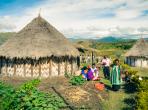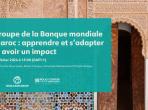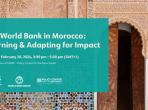Displaying 21 - 30 of 5571

Reaching women and girls in fragile countries - in nine figures
Lessons from the Independent Evaluation Group’s assessment of World Bank Group support on promoting women’s and girls’ economic empowerment and addressing gender-based violence in FCV countries

Meet Virginia Ziulu, IEG's Data Science Trailblazer
In the medical field, an image can produce the right diagnosis and ultimately save a life. This notion, transferred to surveying the complexities of global development, captivated Virginia Ziulu.
The geospatial…

Celebrating women in evaluation
IEG is celebrating the remarkable contribution of women to the evaluation practice. Listen to some of them as they share perspectives on gender equality, how they continue to push for progress, and their message to…
Learning in World Bank Lending (Approach Paper)
The World Bank has a comparative advantage in development knowledge. External assessments, Independent Evaluation Group (IEG) evaluations, and client surveys done by the World Bank and others consistently show that…

The World Bank Group in Papua New Guinea, 2008-23
This evaluation assesses the relevance and effectiveness of the World Bank Group’s support to Papua New Guinea during Fiscal Years 2008-23.

Leveraging Imagery Data in Evaluations
This paper explores the potential of imagery data in evaluations and presents various data types and methodologies demonstrating their advantages and limitations

🎧 Reaching women and girls trapped in violence and conflict
Listen on: Apple Podcasts, or Spotify.
Women and girls living in countries affected by fragility, conflict, and violence face multiple barriers that marginalize them from economic life and put them at a…

Assessing International Development Association’s support for jobs
A new evaluation finds that the jobs strategy of the International Development Association (IDA) has had a positive effect on employment in low-income countries and offers recommendations for how its interventions could…

Le Groupe de la Banque mondiale au Maroc : apprendre et s’adapter pour avoir un impact
Cet événement rassemble hauts responsables gouvernementaux, des représentants de la Banque mondiale et autres experts afin de discuter des conclusions d'une évaluation indépendante récemment publiée sur le soutien de la…

The World Bank Group in Morocco: Learning and Adapting for Impact
This event brings together senior government officials, World Bank representatives, and other experts to discuss the findings from a recently published independent evaluation of the World Bank’s support to the Kingdom…

